Duchess of Cornwall

 Clash Royale CLAN TAG#URR8PPP
Clash Royale CLAN TAG#URR8PPP
| Duchess of Cornwall | |
|---|---|
 Incumbent Camilla, Duchess of Cornwall | |
| Style | Her Royal Highness Ma'am |
| Term length | As long as married to the Duke of Cornwall |
| Inaugural holder | Joan of Kent |
| Website | www.princeofwales.gov.uk |
The Duchess of Cornwall is the title held by the wife of the Duke of Cornwall. Duke of Cornwall is a non-hereditary peerage held by the British Sovereign's eldest son and heir.
The current Duchess of Cornwall is Camilla, Duchess of Cornwall (the former Camilla Parker Bowles), since her 9 April 2005 marriage to Charles, Prince of Wales.
Prior to their marriage, the title was normally used only in Cornwall since customarily the Sovereign's eldest son and heir is created Prince of Wales and his wife is styled the Princess of Wales, and it is those names that are typically used to refer to them. In Scotland the couple use the title Duke and Duchess of Rothesay.
Since the title of Duke of Cornwall can be held only by an heir-apparent who is also the eldest son of the monarch, no woman can be Duchess of Cornwall in her own right. However, this may change now that proposals to change the rules of succession are completed.
Contents
1 History
2 Style and title
3 Duchesses of Cornwall
4 Literary references
5 See also
6 References
7 External links
History
The first Duchess of Cornwall was Joan "The Fair Maid of Kent", who, in October 1361, married Edward, the Black Prince.
Catherine of Aragon was also Duchess of Cornwall through her marriage to Arthur, Prince of Wales, who was the Duke of Cornwall.
Before the present Duchess, the most recent Duchess of Cornwall was Diana, Princess of Wales. During this period, she was usually styled Princess of Wales, as have been most Duchesses of Cornwall.
Before Camilla the only Duchesses of Cornwall to be styled as such were Caroline, wife of the future King George II, who was styled "Her Royal Highness The Duchess of Cornwall and Cambridge" from 1 August to 27 September 1714; and Mary, wife of the future King George V, who was styled "Her Royal Highness The Duchess of Cornwall and York" from 22 January to 9 November 1901. In both cases they were known by the title for only a few months between their respective fathers-in-law's accession to the throne and their husband's creation as Prince of Wales.
Style and title
Prior to the marriage of the Prince of Wales and Camilla Parker Bowles, it was stated that she would be styled Her Royal Highness the Duchess of Cornwall. She does not use the title Princess of Wales, because it is still popularly associated with the former wife of the Prince of Wales, Diana, Princess of Wales. It is intended that Camilla, Duchess of Cornwall, will upon her husband's succession to the throne, become HRH The Princess Consort,[1] despite being legally entitled to the title of Queen.
Duchesses of Cornwall
| Person | Name | Birth | Marriage | Became Duchess of Cornwall | Spouse | Ceased to be Duchess of Cornwall | Death | |
|---|---|---|---|---|---|---|---|---|
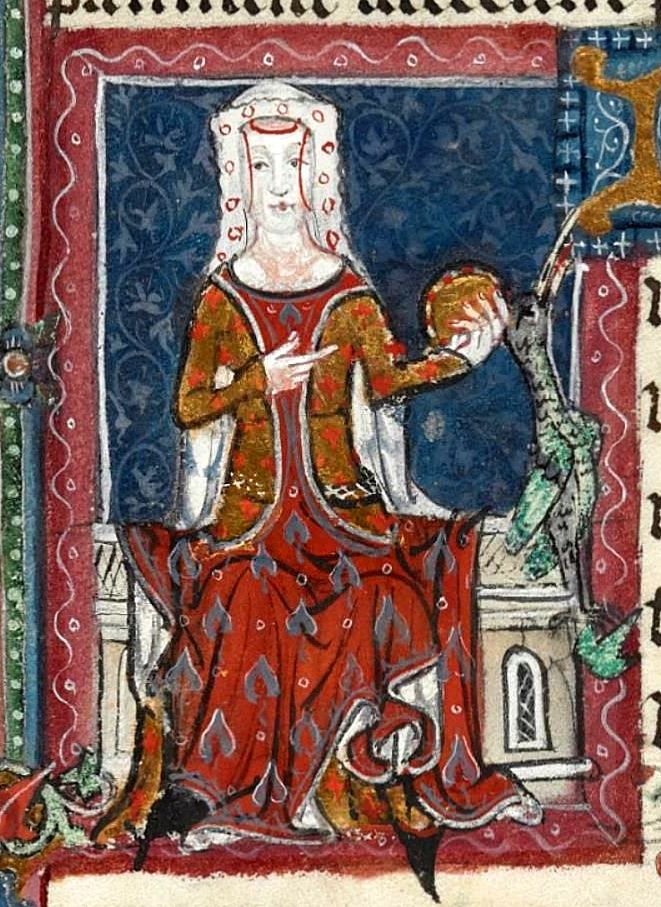 | Joan, Countess of Kent | 19 September 1328 | 10 October 1361 | Edward of Woodstock | 7 June 1376 Husband's death; became Dowager Duchess of Cornwall | 7 August 1385 | ||
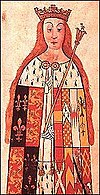 | Lady Anne Neville | 11 June 1456 | 13 December 1470 | Edward of Westminster | 4 May 1471 Husband's death; later became Duchess of Gloucester then Queen Consort as the wife of Richard III | 16 March 1485 | ||
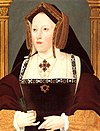 | Infanta Catherine of Aragon | 16 December 1485 | 14 November 1501 | Arthur Tudor | 2 April 1502 Husband's death; became Dowager Duchess of Cornwall; later became Queen Consort as the wife of Henry VIII | 7 January 1536 | ||
 | Princess Caroline of Ansbach | 1 March 1683 | 22 August 1705 | 1 August 1714 | George Augustus of Brunswick and Lüneburg | 11 June 1727 Husband acceded to throne as George II; became Queen Consort | 20 November 1737 | |
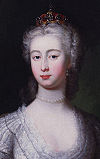 | Princess Augusta of Saxe-Gotha | 30 November 1719 | 17 April 1736 | Prince Frederick | 31 March 1751 Husband's death; became Dowager Duchess of Cornwall | 8 February 1772 | ||
 | Princess Caroline of Brunswick | 17 May 1768 | 8 April 1795 | Prince George | 29 January 1820 Husband acceded to throne as George IV; became Queen Consort | 7 August 1821 | ||
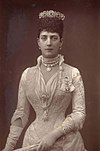 | Princess Alexandra of Denmark | 1 December 1844 | 10 March 1863 | Prince Albert Edward | 22 January 1901 Husband acceded to throne as Edward VII; became Queen Consort | 20 November 1925 | ||
 | Princess Mary of Teck | 26 May 1867 | 6 July 1893 | 22 January 1901 | Prince George | 6 May 1910 Husband acceded to throne as George V; became Queen Consort | 24 March 1953 | |
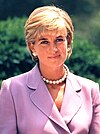 | Lady Diana Spencer | 1 July 1961 | 29 July 1981 | Prince Charles | 28 August 1996 Divorced; assumed the style of Diana, Princess of Wales[2] | 31 August 1997 | ||
 | Camilla Parker Bowles | 17 July 1947 | 9 April 2005 | Incumbent | ||||
Literary references
Shakespeare's King Lear includes the character "Regan, Duchess of Cornwall", Lear's second daughter.
Marion Zimmer Bradley's The Mists of Avalon included the fictional character Morgaine as the Duchess of Cornwall through inheritance.
Igraine, mother of King Arthur, was Duchess of Cornwall when she caught the eye of King Uther Pendragon in many retellings of Arthurian legend.
See also
- Duke of Cornwall
- Duchy of Cornwall
References
^ "The Royal Family — The Prince of Wales — Background". Retrieved 2011-08-21..mw-parser-output cite.citationfont-style:inherit.mw-parser-output .citation qquotes:"""""""'""'".mw-parser-output .citation .cs1-lock-free abackground:url("//upload.wikimedia.org/wikipedia/commons/thumb/6/65/Lock-green.svg/9px-Lock-green.svg.png")no-repeat;background-position:right .1em center.mw-parser-output .citation .cs1-lock-limited a,.mw-parser-output .citation .cs1-lock-registration abackground:url("//upload.wikimedia.org/wikipedia/commons/thumb/d/d6/Lock-gray-alt-2.svg/9px-Lock-gray-alt-2.svg.png")no-repeat;background-position:right .1em center.mw-parser-output .citation .cs1-lock-subscription abackground:url("//upload.wikimedia.org/wikipedia/commons/thumb/a/aa/Lock-red-alt-2.svg/9px-Lock-red-alt-2.svg.png")no-repeat;background-position:right .1em center.mw-parser-output .cs1-subscription,.mw-parser-output .cs1-registrationcolor:#555.mw-parser-output .cs1-subscription span,.mw-parser-output .cs1-registration spanborder-bottom:1px dotted;cursor:help.mw-parser-output .cs1-ws-icon abackground:url("//upload.wikimedia.org/wikipedia/commons/thumb/4/4c/Wikisource-logo.svg/12px-Wikisource-logo.svg.png")no-repeat;background-position:right .1em center.mw-parser-output code.cs1-codecolor:inherit;background:inherit;border:inherit;padding:inherit.mw-parser-output .cs1-hidden-errordisplay:none;font-size:100%.mw-parser-output .cs1-visible-errorfont-size:100%.mw-parser-output .cs1-maintdisplay:none;color:#33aa33;margin-left:0.3em.mw-parser-output .cs1-subscription,.mw-parser-output .cs1-registration,.mw-parser-output .cs1-formatfont-size:95%.mw-parser-output .cs1-kern-left,.mw-parser-output .cs1-kern-wl-leftpadding-left:0.2em.mw-parser-output .cs1-kern-right,.mw-parser-output .cs1-kern-wl-rightpadding-right:0.2em
^ The press secretary to the Queen. "DIVORCE: STATUS AND ROLE OF THE PRINCESS OF WALES". PR Newswire. Buckingham Palace. Retrieved July 9, 2015.
External links
- The Duchess of Cornwall's Official Website
- BBC News report